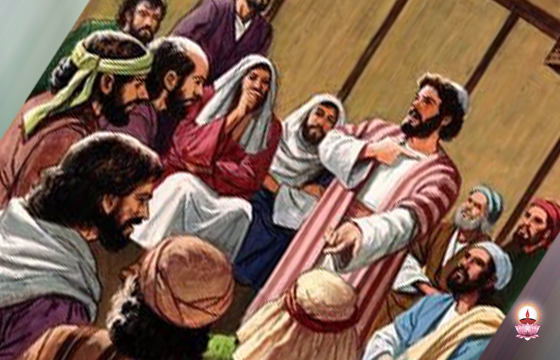Azadi ka Amrit Mahotsav Kolkata event honours four Clergymen
Pope Francis asks businesses to support working women: They’re ‘afraid to get pregnant’
Study: Christianity may lose majority, plurality status in U.S. by 2070
Indian politician declines Magsaysay Award under party pressure
Like John Paul II, Pope Francis heads to Kazakhstan during time of war

Benny Nalkara, CMI
“And God has made no distinction between them and us.” These words pronounced by St Peter can be considered as the God’s own Word in the Jerusalem Council happened in the early days of the Church which is considered as the epoch making event in the history of the Church. This strong statement of Peter in the Council points to the truth that the God-made structures and designs should not be overpowered by the human-made laws and plans.
Structurally the Jerusalem Council episode stands as the watershed of the overall narrative of the book. The decree of the council is referred to three times in the narrative (15:20; 16:4; 21:25). Concisely stated the root of the problem was conflicting attitude towards the Gentiles. At the heart of the dispute was both the fundamental issue of the way of salvation for the Gentiles and the practical question of fellowship between Jewish and Gentile Christians. Circumcision, together with a ritual bath and the offering of a sacrificial victim formed a package of observances for a Gentile to become a Jew. The more conservative section of the early Church, perhaps represented by the Hebrew faction, considered circumcision as indispensable for being part of the people of God now represented by the Christians. In other words, in order to become a Christian one should become a Jew first was their argument. On the other hand, a section of the early church accepted that circumcision was not a pre-requisite for admission to the church as is evident from the episodes of Cornelius and of Samaria. People like Paul who took the Gospel message to the Gentiles were insisting on faith than ritual observances. There was the practical problem of social interaction between the two groups. There arose the need for a forum for discussion because of the hurt feelings these questions and stances raised. This is the background of the Jerusalem council described in Acts 15:6-29. We have a Pauline parallel of this description in Gal 2:1-10.
In the Council we find two factions or parties, namely, “the circumcision party” led by James, and the “non-circumcision party” led by Paul and Barnabas. They both presented their arguments and fought vehemently. Anyway, the president of the meeting, St Peter intervened and gave testimony of the “revelation” he had in the Cornelius episode (15:7-11). “And God, … by giving them the Holy Spirit, just as he did to us; and in cleansing their hearts by faith he has made no distinction between them and us. Now therefore why are you putting God to the test by placing on the neck of the disciples a yoke that neither our ancestors nor we have been able to bear? On the contrary, we believe that we will be saved through the grace of the Lord Jesus, just as they will.” These powerful and divinely animated words of Peter helped the Council to come to an amicable conclusion.
The decision of the council represented a compromise. The waiving of the rule of circumcision was a concession made to the Gentiles. In return for the waiving of the circumcision requirement and all that went with it, the Gentile Christians had to accept regulations which respected the sensibilities of the Jews: abstention from sexual irregularity, from everything that smacked of idolatry, and from meat with blood in it. The issue was not only theological. It had a sociological bearing. As more and more Gentiles were being admitted to the church, the Jews were becoming increasingly apprehensive about their future place in the community. They were afraid of being forced by the majority to accept practices which were really revolting to their sensibilities. It was after considerable emotional struggle that the Church was able to iron out a proper solution. The council is guided by the divine intention as manifested through Peter (15:7-10) and Paul (15:12). The action of the council is portrayed as the fulfilment of the scriptures (15:16-18), another sign of a process being guided by God. It is explicitly stated to be the work of the Spirit (15:28).
The significance of the council was that it highlighted the universality of the Christian movement. It emphasized that Gospel with its all-inclusive openness can be received by anyone without any discrimination. The rituals and rubrics should not be a hindrance for that. The abolition of the circumcision requirement, the distinguishing mark of Judaism, is an indication that Christianity is no more a Jewish institution or reform movement within Judaism. If this decision of the council were not there, Christianity would have ended up as sect within the annals of history. This historic decision of the council made it easy to take the mission beyond the borders and barriers. Confronted with the advance of the Gospel or cultural restrictions, the Council prioritized mission and the outreach. It paved the way for the contextualization of Christian faith in the early Church. But at the same time it underlines the need of prioritizing concern for unity and fellowship over fragmentation in the process of contextualization.
The Jerusalem Council was an occasion that made it clear the importance of love and liberty over the law. It made it abundantly clear that the law was not a requirement for salvation by reaffirming that salvation is by grace for both Jews and Gentiles (Acts 15:11). Peter’s query echoes in our ears: “why are you putting God to the test?” Many arguments would be solved if we today would simply follow the principle set by the Jerusalem Council. What we need today in the Church is a second Jerusalem Council!
Leave a Comment